|
TennisOne Lessons The Competitive Mentality “Aspire to be a Champion. If a Champion is beaten, mostly, it is only by the brilliance of the opponent on the day.” David Sammel Most battles whether in sport or business are won or lost in the mind before the event even takes place. Another reason we lose long before the result is known is through intimidation by the actions, behavior, or reputation of our opponents. Their mere presence, the way they walk or talk, their confidence, or other people’s opinions of them can cause us to slip into thoughts of defeat. Before or during an encounter we can crumble, uncomfortable for a multitude of reasons—aggression, ultra-coolness, aloofness, intellectual snobbery, physical presence, silence, isolation, put downs, confidence etc.. Yet in most cases it is purely our own insecurity that makes the situation seem so intimidating.
Overcome these and you will probably face an even more powerful enemy to your dreams - the notion that the battle is won through one key moment during the encounter. This is the old adage of “fought the good fight,” or “nothing more I could have done as it was just not my day,” or “just a little bad luck at a key moment decided it!” While these clichés can be true and we may admire the frankness and realism of the reasonably brave competitor who accepts defeat when a key moment goes against him, it is the champion who fights this particular enemy of excellence and works to create another key moment. A winner will only concede defeat and stop trying to find an answer when the encounter is over. A winner is not someone who never loses; it is someone who competes until the contest is finished. Naturally, to be considered a winner, success needs to be considerable regardless of the competitive qualities but being a winner should never be confused with the notion of never losing! Champions are human too and cannot always be mentally tough. Sometimes they are beaten by a poor mental performance but these are rare occasions. Generally they have few preconceptions and rarely does one key moment dent their resolve to fight and hang in until the end. The hardest part of defeating a champion is finishing him off because the champion is always looking for an opportunity to get back into a match and remain competitive until the encounter is over. While there is the remotest chance of winning, champions are often most dangerous because they relax, accept the reality of the situation, and just go for it with a controlled high risk strategy. This daring mentality and competitiveness is often a turning point in itself because it is disconcerting and difficult to stop a high risk strategy if it starts to work.
The key to being a brilliant competitor and champion is to understand that often you need to beat the person not beat their game. Champions read people well and constantly monitor opponents’ reactions and moods to find a way of using intimidation tools to dent their opponent’s confidence. There is a strong element of poker in sport and business. One of the finest examples of beating the person was the wonderful "Rumble in the jungle" where Muhammad Ali, who was well past his best, fought George Foreman, a boxer full of confidence and in his prime. George was the stronger fighter at that particular point of their careers and was the heavy favorite to destroy Ali. Ali had other ideas, a plan that attacked the person, and a plan that turned the fight into a personal contest of wills rather than a pure boxing match. The rope-a-dope tactic employed by Ali worked because it was unexpected (Ali had always prided himself on his speed) and because Ali talked non stop during the fight taunting Foreman into a fury by constantly asking him after each hammer blow that Foreman landed “is that all you got?” This anger and desire to show his superior power and hurt Ali clouded Forman’s judgment and his ability to listen to his corner. As he set about "beating" Ali, showing him how powerful his punches were, how badly he could hurt him, and how he would shut him up, he proceeded to punch himself into exhaustion. At this point Ali attacked and knocked him out! Ali had found the key to beating the person not the boxer. The contest was not about boxing it was about one man dismantling another’s mind. It is important to understand that for this tactic to work Ali had to know himself well. He had to know that he was brave and strong enough to take the punishment, a sustained beating without losing his discipline or his clarity of mind during the painful seven or more rounds it would take for George to tire. Becoming a Champion Becoming a Champion takes time and experience. It takes years of repetition and learning, years of gaining personal power through knowledge, often gained from the disappointment of losing. Each time we learn and begin to improve the control of our thoughts under pressure we can begin to build the mind of a Champion. Star performers have a desire for success that becomes instinctive.
If you look at how champions develop there is a definite progression as they come to terms with their abilities and mature from precocious to sublime talents. Pete Sampras won the US Open at 18 and then had two relatively poor years as he learned to harness his game and his status in the game before emerging as a wiser player who could use his talent rather than be at the mercy of it. Roger Federer was slower to mature and at 22 won his first Slam at Wimbledon. Having already been through the process without winning a Slam he was truly ready and was only missing the confidence that a player gains from winning a Slam. With this under his belt he immediately became prolific. Andre Agassi had two careers. One as a precocious teen and young man who had little appreciation of the level of discipline required to be a prolific champion and prevented him from owning the top spot, and one that began after a time of reflection. His talent was no different the second time round but his mental approach was and thus his competitive spirit was unleashed on the tennis world in a far more organized and professional manner which was incredibly tough and consistent and allowed him to take his rightful place as a number one and an all time great. The Mental and Physical
It is important to be realistic about the level at which you are competing and acquire a mental toughness at that point. Moving up the levels is a combination of first acquiring the skills that allow you to compete at that level, after which the battle becomes almost entirely mental. Given similar skills the fight becomes two pronged with a mental battle with yourself and a separate contest with your opponent. (It is important to understand that a novice will not compete with a pro no matter what psychological qualities or mental toughness he brings to the table) As an example, Michael Jordan did not successfully switch from basketball to baseball because, although he was proven to be mentally tough, he had not acquired the necessary skills to compete at the pro level in baseball. He was not able to make up the years that the baseball players had spent honing their talent, learning the small details of success required for baseball at the highest level. While others were becoming experts in baseball he was becoming an expert in basketball On reflection it was an overconfident move that overestimated his athletic talent and underestimated the years of experience and detailed work needed to develop into an accomplished baseball star. The reason for him not making it in baseball was not mental weakness or athletic ability but the years of experienced missed in developing his baseball skills which could not be made up in a short period of time. There is no doubt that acquiring a positive and persistent attitude to the task is fundamental to success and that desire, intelligent training and mental toughness can overcome tremendous obstacles, but it would be wrong to peddle the dream that anything is possible for all people.
Increasingly in sport, genetic make-up is directly related to the possibility of success, as is the talent to acquire the necessary skills. It is clear that if you are a slow runner you will be unable to become an Olympic 100m champion even if you dedicate your life to improving. You will continue to improve and set personal bests but genetic realism has to be taken into account when choosing a lifetime goal. However with passion, a smart work ethic, and self-belief there should be no ceiling on your personal achievements until the journey is done. This may mean winning an Olympic Gold, running a marathon in 3½ hours, or losing 20lbs in weight. It is the intent with which you go about the task and the congruency of your words and actions that will alert people to your mission and have a profound effect on the end result. One fact is certain; any person with a desire to strengthen their competitive mind can do so. Each individual has to decide if he wants to be a competitor and with this decision begins a path of exploration into oneself through reading, playing, and learning from all these experiences what personal "modus operandi" works for you under pressure. I reiterate, you can learn from many books, articles, coaches, and champions but the key is being able to personalize your competitive nature into your own way.
Recruited as a top 10 junior from South Africa, he played one season for UT before transferring to North Texas under AG Longoria. He played satellites, challengers, and many years of Dutch team tennis. Visit David's websites mctacademy and tennis4everyone. |
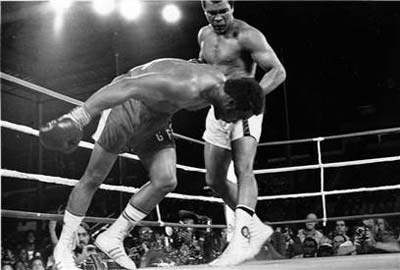

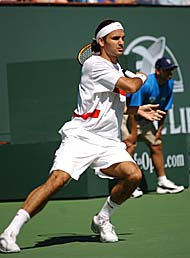
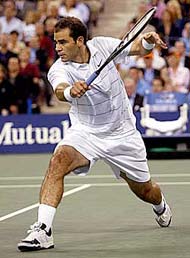
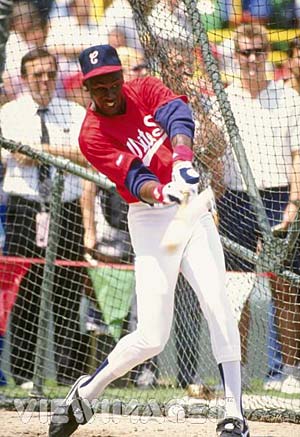

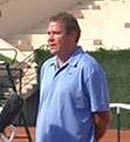 David Sammel is Director of Coaching for the newly formed Monte Carlo Tennis
Academy, a unique touring concept with its training base at the famous country
club site of the Monte Carlo Masters tournament. Previously, as National coach
for the LTA he headed one of four National Academies in the UK. Between 1990 and
2002 he coached and toured with many Great Britain Davis Cup players.
David Sammel is Director of Coaching for the newly formed Monte Carlo Tennis
Academy, a unique touring concept with its training base at the famous country
club site of the Monte Carlo Masters tournament. Previously, as National coach
for the LTA he headed one of four National Academies in the UK. Between 1990 and
2002 he coached and toured with many Great Britain Davis Cup players.